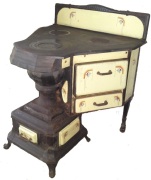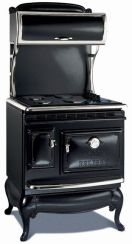Relax. I’m not going to talk about words which might have deleterious effects on certain  overly coddled college students who hear them. (This is, generally speaking, a non-political website. I don’t care who you vote for as long as you have a reason for doing it. That doesn’t mean I’m interested in discussing your politics, or my own. I’m not, ever. I only do that over drinks–lots and lots of drinks.)
overly coddled college students who hear them. (This is, generally speaking, a non-political website. I don’t care who you vote for as long as you have a reason for doing it. That doesn’t mean I’m interested in discussing your politics, or my own. I’m not, ever. I only do that over drinks–lots and lots of drinks.)
The kind of trigger words I’m talking about are those that convey a sense of place. F’rinstance, let’s say you’re writing a scene (or a memoir) that takes place in your imaginary grandmothers’s kitchen (or possibly your imaginary great-grandmother’s kitchen. With any luck, you’re younger than I am). For me, that’s a kitchen built in the 1930s. Also for me, it’s located somewhere in suburban Chicago. Your granny’s kitchen may have existed somewhere far, far away, in time and/or place.
Now, when we attempt to describe that kitchen, we have a vast array of descriptors to choose from. For me, it’s a gas stove with white enamel doors covering the oven. Stark, wooden shelves bedeck the walls around the appliance. A variety of cooking tools hang  beneath them; there are no cabinets, no windows, no wallpaper, no decorations. There’s a radio on the plain, laminate counter top. The only warmth in the room comes from the oven. The best part is the smell of freshly baked bread, an aroma that permeates my soul and leaves me with my mouth open.
beneath them; there are no cabinets, no windows, no wallpaper, no decorations. There’s a radio on the plain, laminate counter top. The only warmth in the room comes from the oven. The best part is the smell of freshly baked bread, an aroma that permeates my soul and leaves me with my mouth open.
Your granny’s kitchen is likely very different. It could have a black, cast iron, wood burning stove. There could be a spindle-legged table in the mix, too. Lengths of firewood might be stacked in one corner; an apron might hang from a peg on the wall. There could be a farm calendar on the wall, or a bit of cross-stitched wisdom, maybe a psalm or a prayer.
 On the other hand, your great-grandmother’s kitchen may have been far more up-to-date, the kind one might describe as mid-century urban sophisticate. It might’ve had brightly painted walls, finished cabinetry and a butcher block table at ground zero. Her stove might’ve been electric, and her counters may have been crowded with lesser appliances–a toaster, a blender, and/or a coffee maker.
On the other hand, your great-grandmother’s kitchen may have been far more up-to-date, the kind one might describe as mid-century urban sophisticate. It might’ve had brightly painted walls, finished cabinetry and a butcher block table at ground zero. Her stove might’ve been electric, and her counters may have been crowded with lesser appliances–a toaster, a blender, and/or a coffee maker.
The point is, as a writer, you can’t be satisfied thinking your readers will imagine your setting exactly the way you see it. You have to paint the scene for them, and you have to make sure you’re using the right trigger words–words that provide a specific feel. The trick is to measure out only as many as you need to get the picture painted. Too much description is just as bad as too little; either will disappoint the reader.
One of the best ways to gauge whether or not you’ve overdone it, is to examine the pacing of the work. Does it still move along? Will readers have to struggle to hang on to the thread? Does anything really happen there? If not, all the description in the world won’t save the scene.
 If you find yourself in such a situation, consider doing something to the location. If it’s important the way it is, do something to change it! A fire, an earthquake, or a plastic bag full of frozen human waste hurtling down through the ceiling after being accidentally discharged by a passing airliner might just do the trick. (I would be gratified to see this occur more often in fiction than in real life, but I doubt a new meme is in order.) A falling tree or a bread truck bursting into the room from outside will definitely change things.
If you find yourself in such a situation, consider doing something to the location. If it’s important the way it is, do something to change it! A fire, an earthquake, or a plastic bag full of frozen human waste hurtling down through the ceiling after being accidentally discharged by a passing airliner might just do the trick. (I would be gratified to see this occur more often in fiction than in real life, but I doubt a new meme is in order.) A falling tree or a bread truck bursting into the room from outside will definitely change things.
Make the setting you envision work for you. If it doesn’t, change it. In the process you might just discover something even more interesting than what you originally planned.
–Josh





Trigger Words, are they especially important in the introduction of a work? To set the scene for the reader. Should a writer limit these? Or would it limit creativity?
They’re important if the writer wishes to convey a particular setting. Whether or not it’s appropriate for the opening would depend on the work itself. My guess is that it wouldn’t be, unless the setting is uber-critical to the story. I’m thinking about science fiction stories, but it could easily relate elsewhere. As for limiting their use, I rely once again on the “spice rule.” (A little spice can improve a meal; too much may poison the diner.)
Love it. And I laughed at the truck hitting and ending up in the house. We really had that happened to us and when I heard the crash and opened our bedroom door, I laughed then as well. Patrice
You *do* understand I make this stuff up, right? Real life is SO much more bizarre than what we fantasize about. Oy.
Okay, I have now spent most of my day intrigued by all these mavalous (marvelous) suggestions. My only little problem is that I wrote my 300 words before all this great information hit my brain waves, but I certainLY will go back and revise. Loving all these blogs, but feeling somewhat addicted!!
Trust me when I say you’ll have many more opportunities to try and press all this stuff into practice. I sure as hell didn’t learn it overnight. I don’t expect anyone else to, either.